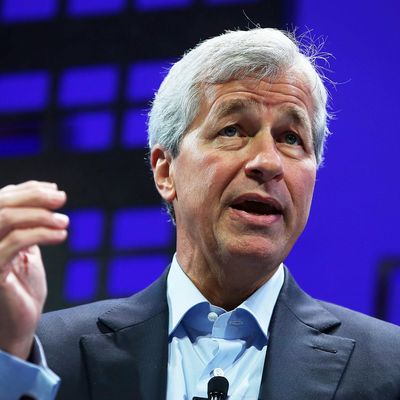
This week, Jamie Dimon of JPMorgan Chase took to the pages of the New York Times to announce that his banking behemoth was giving its lowest-paid employees a raise from $10.15 an hour to $12 an hour.
“A pay increase is the right thing to do,” he wrote. “Wages for many Americans have gone nowhere for too long. Many employees who will receive this increase work as bank tellers and customer service representatives. Above all, it enables more people to begin to share in the rewards of economic growth.”
The op-ed won Dimon a round of applause. “For low-wage workers across the country, any boost in income is necessary and important, so today’s announcement by JPMorgan Chase that it will raise the hourly wages of its lowest-paid employees … is good news,” said Christine Owens, the executive director of the National Employment Law Project, in a statement, also calling for more companies to give yet bigger raises. Swarms of outlets followed up and people on social media appreciated the banker’s benevolence.
Were that it really benevolence, or that the raise was a meaningful one.
Wages have been rising as the unemployment rate has fallen below 5 percent and the labor market has tightened. Employers, in other words, are now competing to hire and retain workers, which means offering those workers more money and better working conditions more broadly. Dimon is doing what thousands of other corporate executives and managers are doing — and what all companies have to do when the economy is good. He just managed to convince the op-ed editors at the Times to give him some publicity for doing it.
Moreover, the raise is puny — $1.85 an hour, spread out over three whole years, meaning inflation will eat some of it up. “That’s a roughly 3.2 percent annual boost after taking projected future inflation into account,” noted Lawrence Mishel of the Economic Policy Institute, a left-of-center think tank. “This hardly seems to deserve a parade.”
And it is a tiny raise given how lucrative the business is. JPMorgan made a profit of $5.5 billion on revenues of $24 billion in just the first three months of the year — and that’s during the toughest year for banks since the financial crisis.
But the levers that would have forced the bank to spend some of that money on its lowest-paid, lowest-skilled employees are broken. Workers’ collective-bargaining power is shot, and the federally mandated minimum wage is just $7.25 an hour. A strong labor market and better federal and local policies — not the good intentions of a few corporate titans — are what’s going to ensure that bank tellers and janitors and the like keep on getting raises.
Dimon, by the way, earned $27 million last year.





























